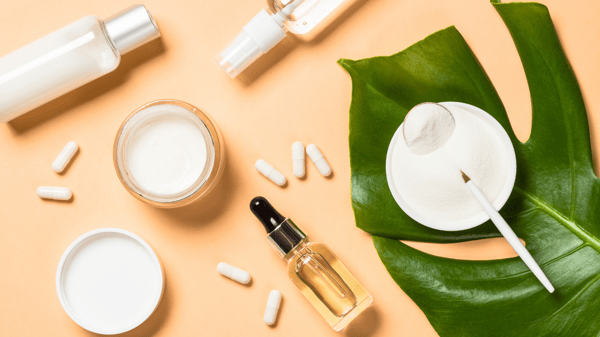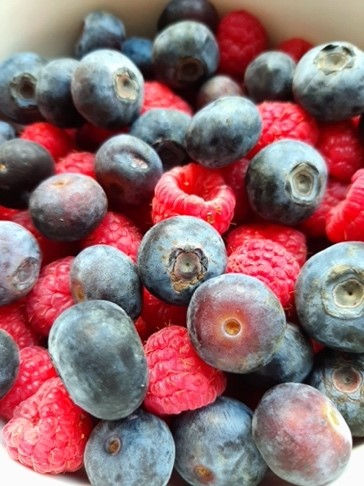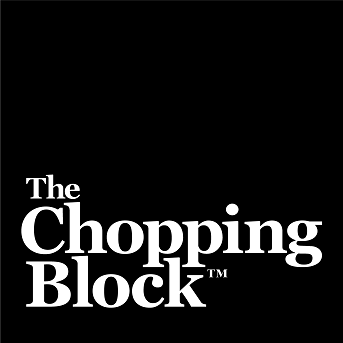Whatever room you’re in, anytime, anywhere, with anyone, what is always the most popular protein in the room? No, it’s not beef. Not chicken either. Nope, not even eggs. It’s collagen. Collagen is the most abundant protein in your body, a building block for muscles, skin, bones, tendons, and cartilage; basically, it helps hold our bodies together. So yeah, I’d say it’s the most popular protein in the room. And since the 2010’s, more people have been asking, “do we need to consume collagen? Will it keep us looking younger and moving better even if we don’t need to consume it?”
 Well let’s start internally: our bodies make collagen in-house. There are twenty-nine different types, but the majority of collagen in our bodies is either Type I (bones, ligaments, tendons, skin), Type II (cartilage), or Type III (skin, blood vessels, and internal organs). Natural collagen production gradually declines as we age, contributing to wrinkles, joint pain, stiffer tendons, etc. This may be why we’ve jumped at the assumption that consuming extra collagen means maintaining our youth. According to Google trends, online searches for collagen have steadily increased since 2014, leading to a 1,827.6 million dollar supplement industry as of 2019 with projections to more than double in the next decade.
Well let’s start internally: our bodies make collagen in-house. There are twenty-nine different types, but the majority of collagen in our bodies is either Type I (bones, ligaments, tendons, skin), Type II (cartilage), or Type III (skin, blood vessels, and internal organs). Natural collagen production gradually declines as we age, contributing to wrinkles, joint pain, stiffer tendons, etc. This may be why we’ve jumped at the assumption that consuming extra collagen means maintaining our youth. According to Google trends, online searches for collagen have steadily increased since 2014, leading to a 1,827.6 million dollar supplement industry as of 2019 with projections to more than double in the next decade.
But as we know, online popularity doesn’t necessarily reflect real life, so do these collagen creams, pills, and powders back up their popularity?
Most scientific studies have focused on skin and joint health and have found collagen supplements to improve skin elasticity, joint mobility, and joint pain. However, many of these studies are small, are not human studies, and have been found to be partially or fully funded by related industries that would benefit from the sale of collagen supplements. Overall, there is a lack of a developed body of research with large, human-subject, and unbiased randomized controlled trials. In addition, the dietary supplement industry is not regulated by the Food and Drug Administration, meaning supplements aren’t verified that they contain what they say they do or that they’re free of contaminants such as heavy metals, bacteria or pesticides. A 2020 analysis of 28 collagen supplements by the Clean Label Project found that 64% had detectable levels of arsenic, one third for lead, and 17% for cadmium.
We also still don’t know if the collagen from supplements gets used for collagen in our bodies. Everything we consume is broken down to its basic components in order to be absorbed and then those components are built back up for whatever is needed most at that time. Since there are hundreds of different proteins used in all kinds of processes in our bodies, it’s difficult to say that the amino acids from the collagen in a supplement will all stick together and be built back up into only collagen in our bodies.
So what about maybe collagen in food?
 Collagen is found in foods such as meats, fish, and egg whites. However, experts say the best way to boost collagen through consumption is not necessarily to eat collagen itself, but to eat foods that provide the basic components needed for collagen production by our bodies, such as:
Collagen is found in foods such as meats, fish, and egg whites. However, experts say the best way to boost collagen through consumption is not necessarily to eat collagen itself, but to eat foods that provide the basic components needed for collagen production by our bodies, such as:
- Protein: animal or plant sources
- Zinc: shellfish, legumes, nuts, seeds, whole grains
- Vitamin C: citrus, berries, leafy greens, bell peppers, tomatoes
- Sulfur: broccoli, onions, garlic
A balanced diet not only provides the basic ingredients for our own collagen production, but it also guarantees that we’re eating antioxidants, which are compounds that fight the oxidative stress that degrades collagen and are found in fruits, vegetables, nuts and seeds. Check out our classes such as our virtual Instant Pot Plant-Based Cooking demo on Sunday, February 6 at 10am CST or our Building Blocks class on Chicken Butchery and Cooking on Saturday, February 19 at 10am CST to help get some ideas and tips!
 Lastly, it’s important to remember that other factors drop collagen production even more quickly than aging. These include smoking, excess exposure to sunlight, chronic high levels of stress, and lack of adequate sleep or exercise. If collagen supplementation is preferred, then these other factors need to be controlled to create and maximize the benefits.
Lastly, it’s important to remember that other factors drop collagen production even more quickly than aging. These include smoking, excess exposure to sunlight, chronic high levels of stress, and lack of adequate sleep or exercise. If collagen supplementation is preferred, then these other factors need to be controlled to create and maximize the benefits.
Okay, so what’s the final opinion on popularity?
It’s Regina George-esque. While collagen supplements may not directly be harmful, research on whether they’re effective is lacking, regulation on ingredients and efficacy are absent, and it’s still unclear how our bodies are actually using them after we consume them. However, other factors, such as eating a balanced diet, are proven to support natural collagen production, along with providing multiple other benefits, and therefore, may be better ways to spend your money. Just because collagen supplements are popular, doesn’t mean you should ditch the friends that have stayed by your side this whole time for them.
Learn how to make plant-based food in your Instant Pot in our upcoming virtual class. These vegetarian and gluten-free dishes can also easily be adapted for vegans:
- Tomato and Zucchini Pashtida (Israeli Crustless Quiche)
- Vegetable and Chickpea Tagine
- French Lentil Salad with Walnuts and Feta












